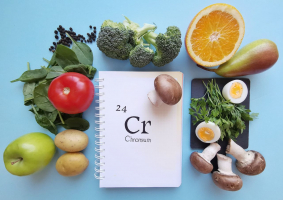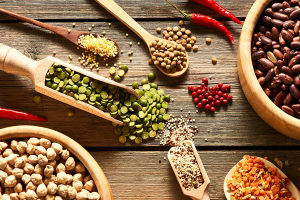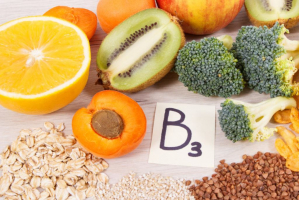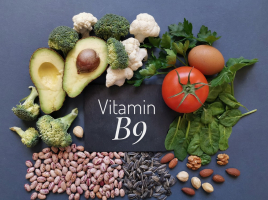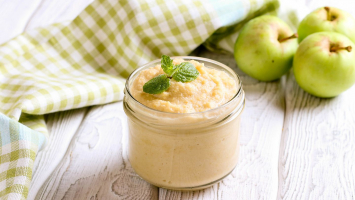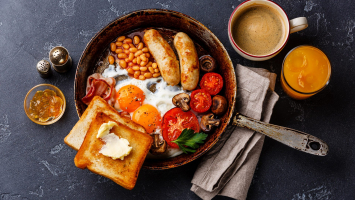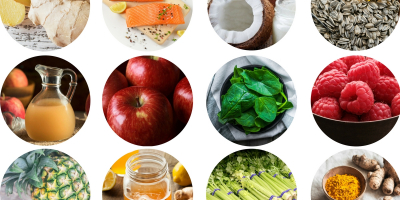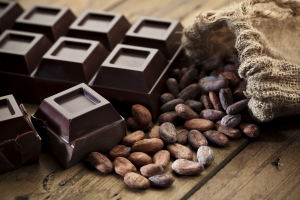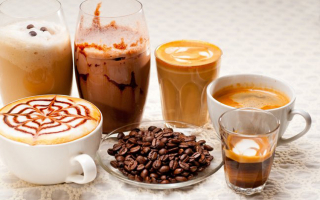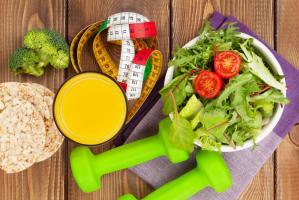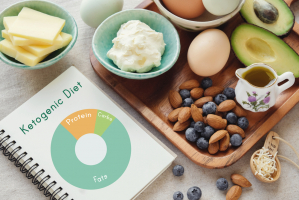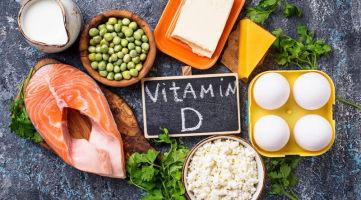Top 15 Surprising Foods and Drinks That Are High in Sugar
Consuming excessive amounts of sugar might seriously harm your health. Obesity, heart disease, type 2 diabetes, and cancer risk are among the many diseases ... read more...that have been related to doing this. It's common for people to try to cut back on their sugar intake, but it's easy to underestimate how much you're actually taking in. One of the reasons is that many foods, including ones that you wouldn't even consider sweet, contain hidden sugars. Below are foods and drinks that may contain more sugar than you’d think.
-
Yoghurt has a lot of nutritional value. But not all yoghurt is made equally. Low-fat yoghurts frequently include added sugar to improve their flavour, just like many other low-fat products.
For instance, a single cup (245 grammes) of low-fat yoghurt may have about 45 g, or nearly 11 teaspoons, of sugar. In just one cup, this exceeds the daily limit for both men and women. Most nutritionists agree that the amount you add on your own to plain yoghurt, even if you add a sweetener like honey or maple syrup, will be far lower than the amount that manufacturers add to flavoured yoghurts. Furthermore, it doesn't appear that low-fat yoghurt has the same health advantages as full-fat yoghurt. Choose yoghurts with the least amount of added sugar when making your selection. Additionally, picking one without fruit and replacing it with your own allows you to manage the sugar amount and boost the nutritious value.
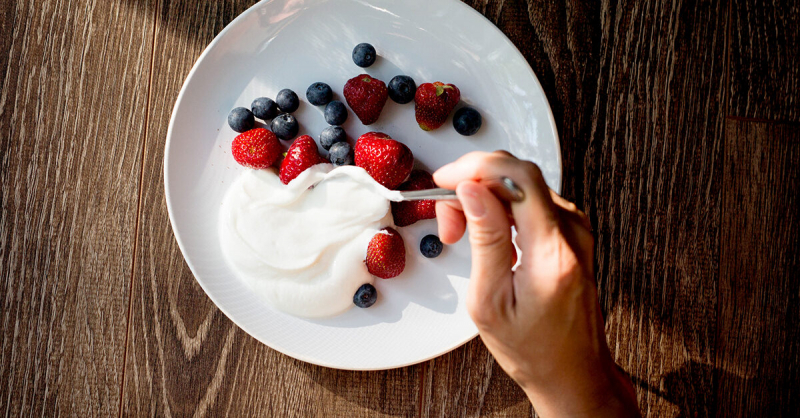
Low fat yogurt 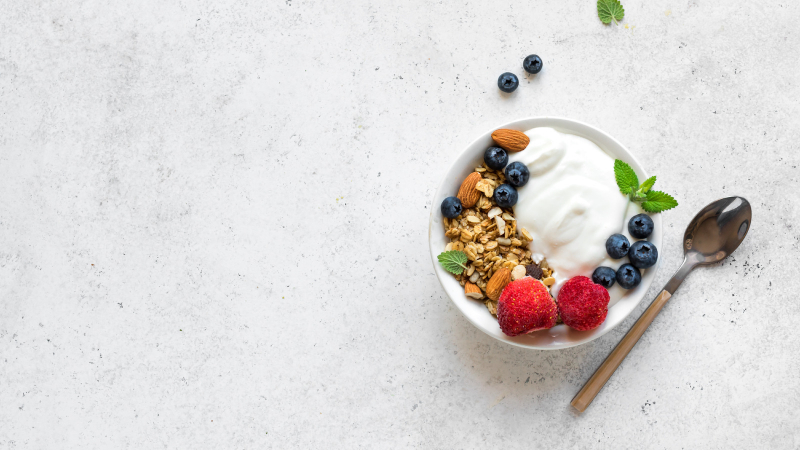
Low fat yogurt -
BBQ sauce can be used to make a delicious marinade or dip. However, another condiment that may include a lot of extra sugars is this one. 2 tablespoons (or 28 grams) of sauce may have 9 g or less of sugar in it. This amounts to more than 2 teaspoons.
In fact, the weight of BBQ sauce may include as much as 33% pure sugar. This makes it simple to eat a lot of sugar without realizing it. It is unreasonable to expect to find barbecue sauce devoid of all sweeteners. Instead, compare ingredient lists and pick a product where the sweetener is listed as far down as feasible. Look at the labels and select the sauce with the least amount of added sugar to be sure you aren't getting too much. Keep an eye on your portion sizes as well.
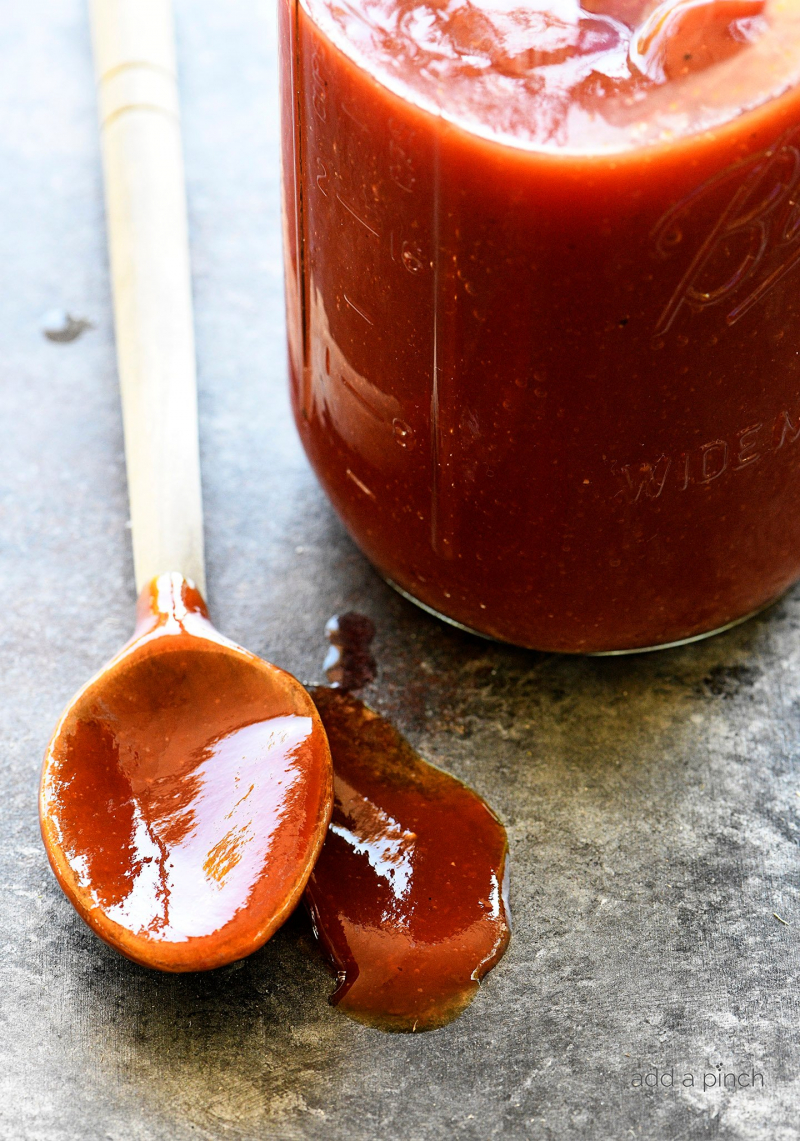
Barbecue (BBQ) sauce 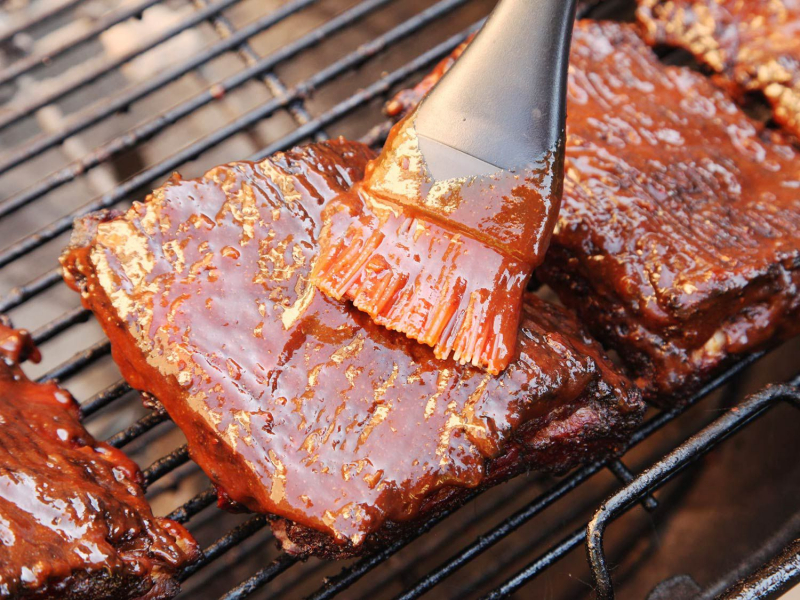
Barbecue (BBQ) sauce -
One of the most widely used condiments in the world is ketchup. Ketchup goes with just about everything—French fries, eggs, hash browns, burgers, deli meats...the list goes on and on. But like BBQ sauce, it frequently contains a lot of sugar.
When using ketchup, try to be cautious of your portion size and keep in mind that a single tablespoon has almost 1 teaspoon of sugar in it. Adding just a tablespoon of ketchup to your burger could result in a teaspoon of extra sugar. Check the ingredient list of ketchup to see if it has no added sugars. Additionally, you can choose a brand where the sweetener appears near the end of the ingredient list, indicating that little sugar has been added (because food ingredients are listed in order of their abundance in the recipe from high to low).
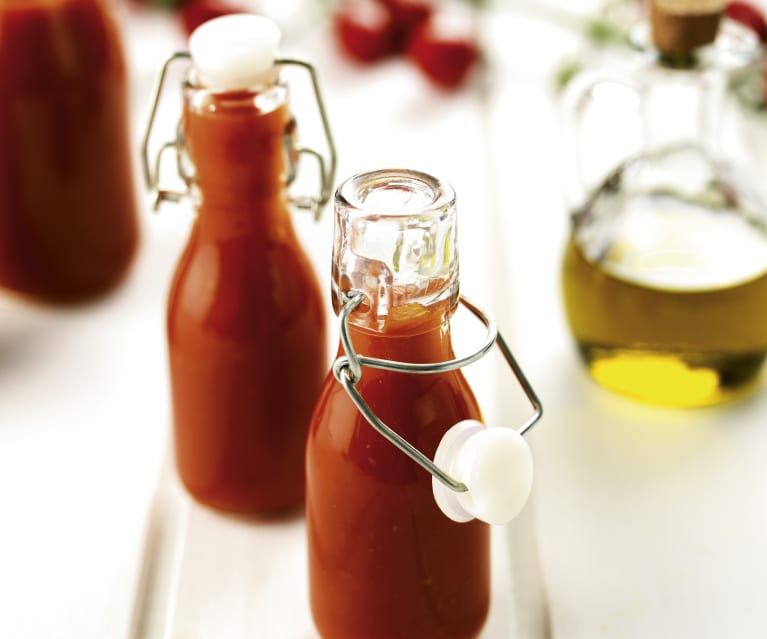
Ketchup 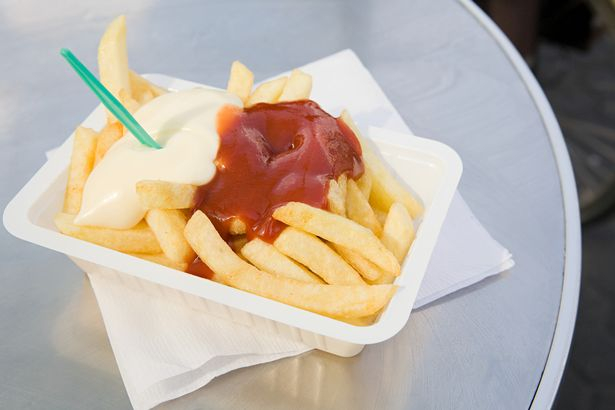
Ketchup -
Fruit juice has some vitamins and minerals, just like whole fruit does. But all fruit juice — whether it's apple, orange, grape, or a fancy blend such as peach-mango-blueberry — is high in sugar.
To avoid consuming too much sugar, use 100% fruit juice instead of versions that have been sweetened with sugar. In fact, fruit juice that has been sweetened with sugar might contain the same amount of sugar as a sugary beverage like Coke. Approximately 30 grams of sugar, or nearly eight teaspoons, are included in an eight-ounce serving of juice or cola on average. Fruit juices with added sugar may have some of the same negative health effects as sugary soda. When possible, choose whole fruit or 100% fruit juice; avoid fruit juices that have added sugar.
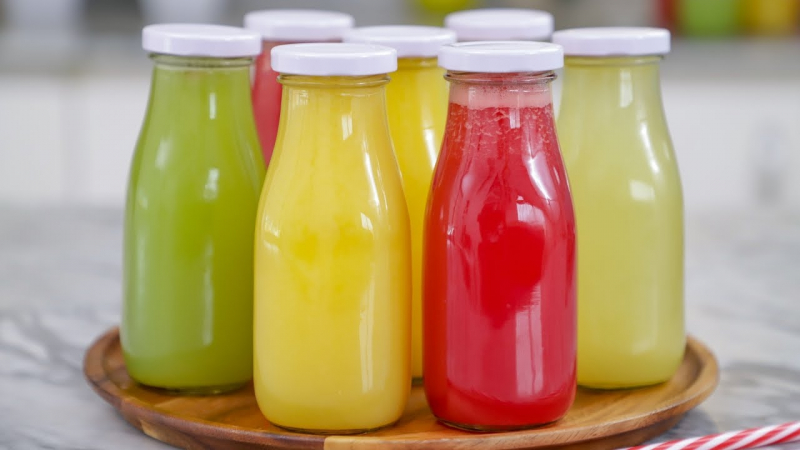
Fruit juice 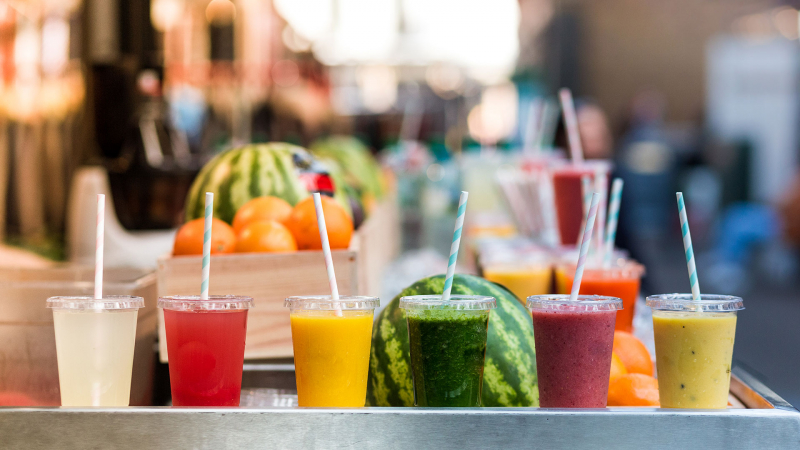
Fruit juice -
You weren't too keen on the white pasta's processed carbs, but you need to be careful with the sauce. Foods like spaghetti sauce, which people don't even consider to be sweet, frequently hide added sugars. Due to the fact that all spaghetti sauces are made with tomatoes, they all naturally include some sugar. However, a lot of spaghetti sauces also have sugar added to them.
Making your own spaghetti sauce is the greatest method to guarantee that it is free of extra sugar. However, if you must buy prepared spaghetti sauce, look for a tomato sauce that is free of added sugars by reading labels, comparing brands, and choosing goods within brands. Many commercial tomato pasta sauces have added sugars. Or read the label carefully and choose one that contains sugar as an ingredient but put it very at the bottom. This suggests that it is not a significant ingredient.
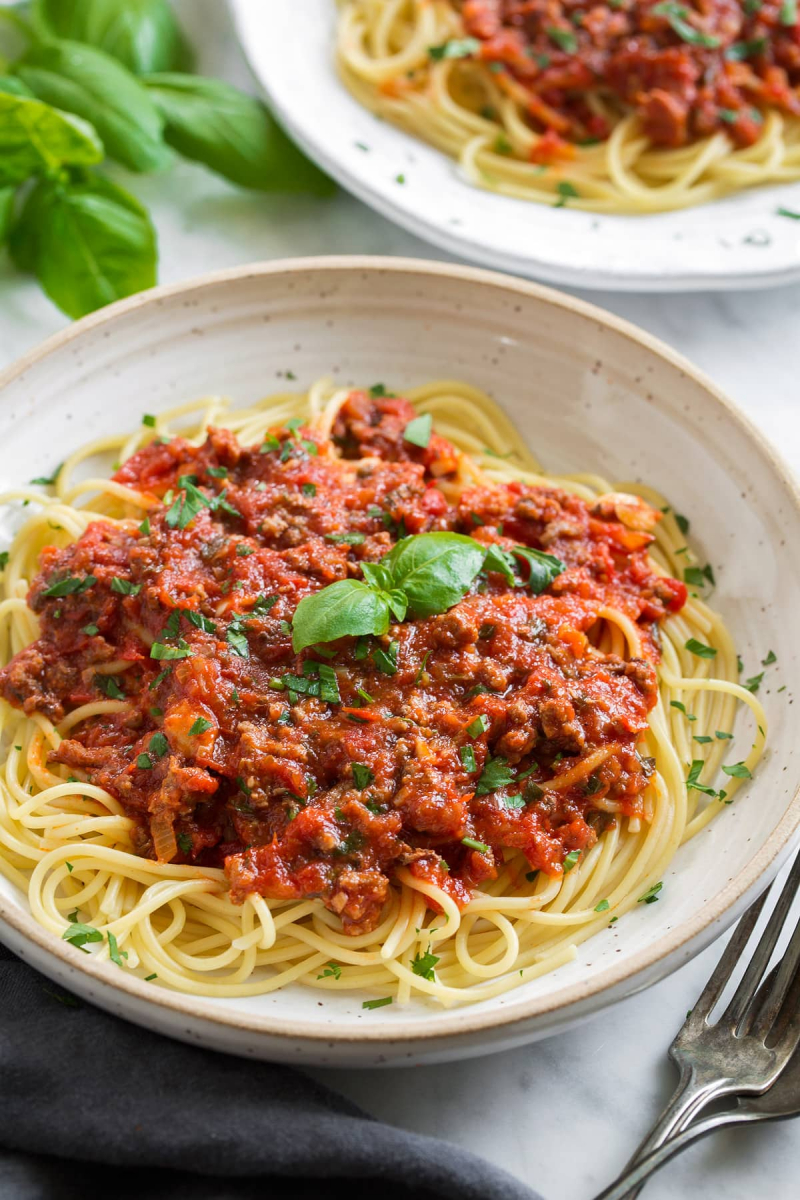
Spaghetti sauce 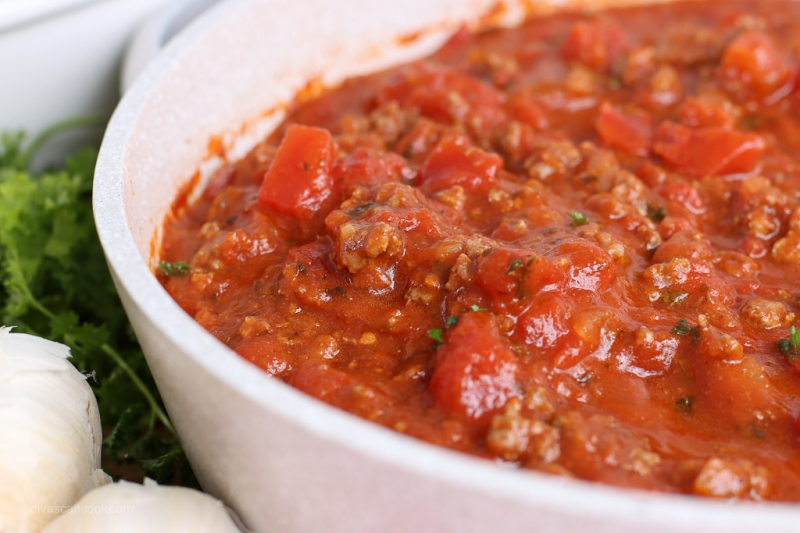
Spaghetti sauce -
Sports drinks are sometimes mistaken as a healthy option for athletes. But for the non-athlete, a sports beverage is just another sugary drink.
Sports drinks, on the other hand, are designed to hydrate and fuel athletes over lengthy, intense periods of exercise. Because of this, they are rich in added sugars that are easily absorbed and converted to energy. In fact, a typical 20-ounce (591 mL) bottle of a sports drink will include 161 calories and 32.5 grams of added sugar. It's the same as 9 teaspoons of sugar. Sports drinks are consequently regarded as sugary drinks. They have a link with soda and fruit juice sweetened with sugar for obesity and metabolic disease. If you're not an athlete or marathon runner, you should probably just stick to water while exercising.
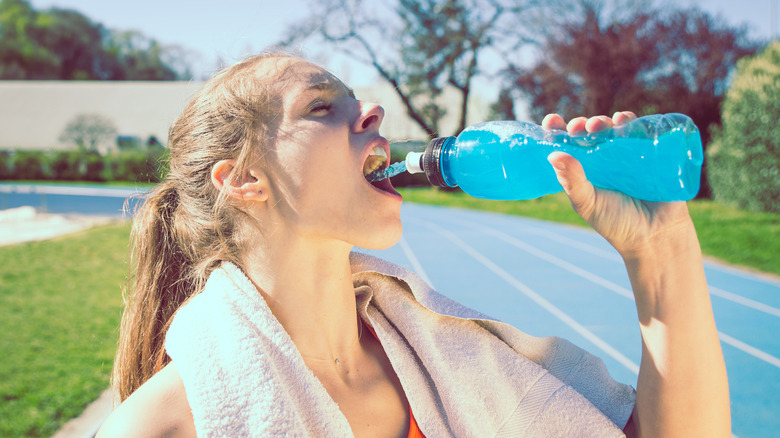
Sports drinks 
Sports drinks -
There seems to be a rise in the popularity of nondairy, plant-based milk substitutes for cow's milk. According to research from 2018, consumption of milk from cows has been falling while interest in alternative milks has increased. The following are some examples of the various plant-based milk products:
- Almond
- Hemp
- Oat
- Soy
- Coconut
- Rice
- ...
The center aisles and refrigerator section of your grocery store have a large selection of non-dairy "milks" for you to choose from. Because some plant-based milk substitutes have higher levels of sugar and salt than cow's milk, consumers may want to look for low-salt and no-added-sugar options. Despite being labeled as "original" or "no added sugars", they typically include a sweetener of some type. If you're concerned about added sugar, "unsweetened" plant milk is the one to choose.
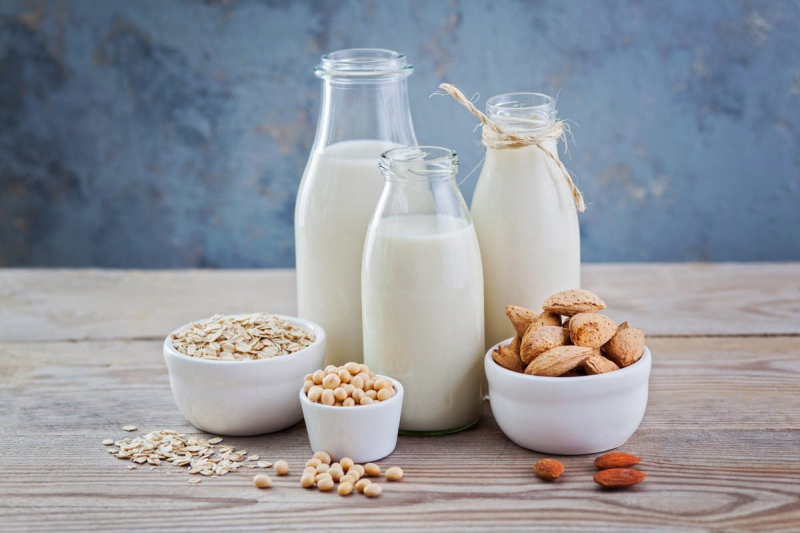
Plant-based milks 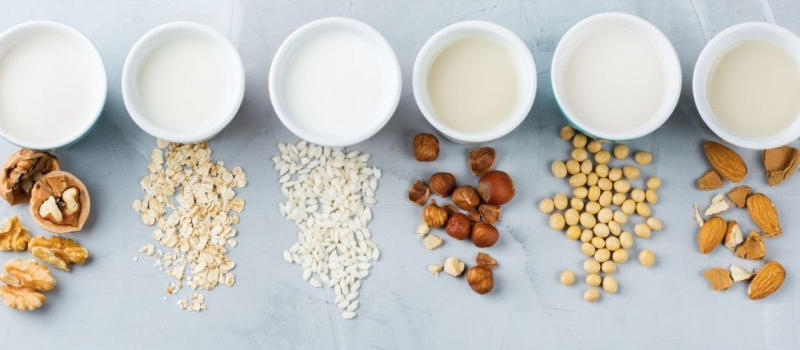
Plant-based milks -
Granola is a breakfast cereal that's similar to muesli. Granola may have the look of a healthy snack, but it is almost usually sweetened with additional sweets such as corn syrup, honey, or brown sugar.
Oats are the primary component of granola. Plain rolled oats are a nutritious cereal that has a great blend of carbs, protein, fat, and fiber. Granola, on the other hand, contains oats that have been blended with nuts, honey, or other sweeteners, which raises the sugar and calorie content. Additional hidden sugars are added by some granola's use of chocolate or sweetened dried fruit. In fact, 100g of granola might contain up to 5-7 teaspoons of sugar and 400–500 calories. If you enjoy granola, consider creating your own or choosing a brand with less added sugar. Instead of pouring a full bowl, you can add it as a topping over fruit or yogurt.
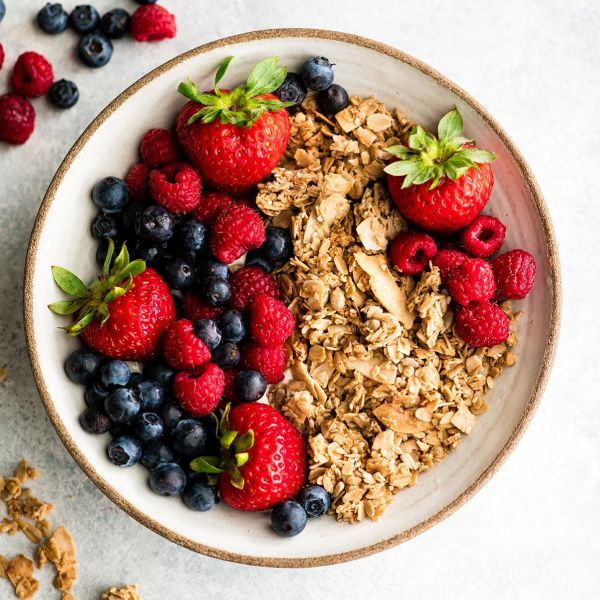
Granola 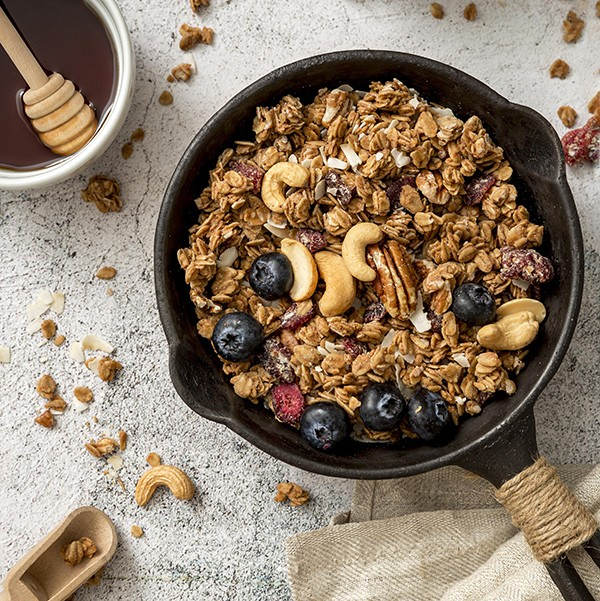
Granola -
According to a May 2017 article in Public Health, about 68% of coffee consumers brew their coffee with some type of addition, such as sugar or other sweeteners. The popularity of flavored coffee conceals the shocking amount of sugars that are sometimes hidden in these drinks.
There may be as much as 45g of sugar in a large flavored coffee or coffee drink at some coffee shop chains. In terms of added sugar per serving, that comes out to around 11 teaspoons. Therefore, it's likely that your morning coffee will start to increase your daily sugar intake – unless you choose to drink it black. Due to the significant association between sugary drinks and ill health, it's generally recommended to stick with coffee that doesn't have any flavoring syrups or added sugar. To make your coffee feel more delicious without adding as much sugar, try adding a splash of whole milk or heavy cream.
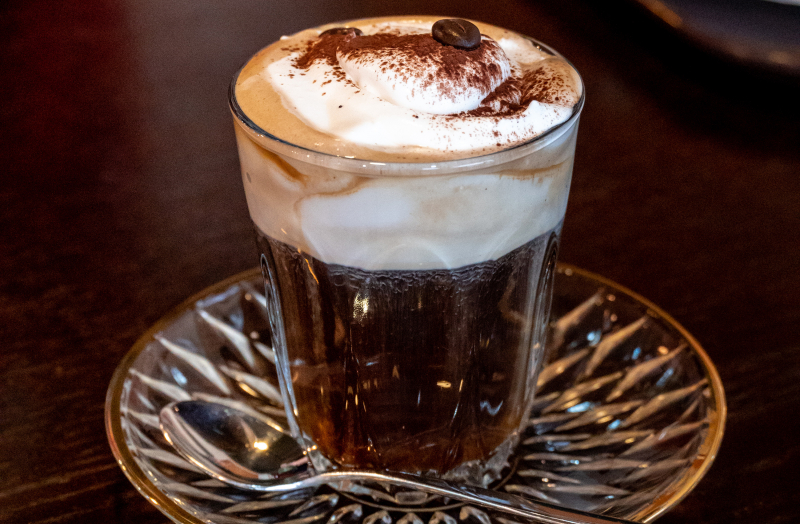
Flavored coffees 
Flavored coffees -
Iced tea and hot days seem to be a match made in heaven. The Tea Association of the USA estimates that iced tea makes up between 75 and 80% of all tea drunk in the country. However, tea in a bottle might not provide all the health benefits you're hoping for.
“You may think you’re choosing a healthier option when you grab a bottle of iced tea instead of a soda, but in many cases, you’re getting about as much sugar”, says Amy Keating, R.D., a nutritionist at Consumer Reports. Iced tea is typically flavored with syrup or sweetened with sugar. It is widely consumed in a variety of forms and tastes, therefore its sugar content can change slightly. A 12-ounce (340 mL) serving of commercially made iced tea typically has 35 g of sugar. This is around the same as a Coke bottle. If you enjoy tea, go with regular tea or iced tea without any additional sweets.
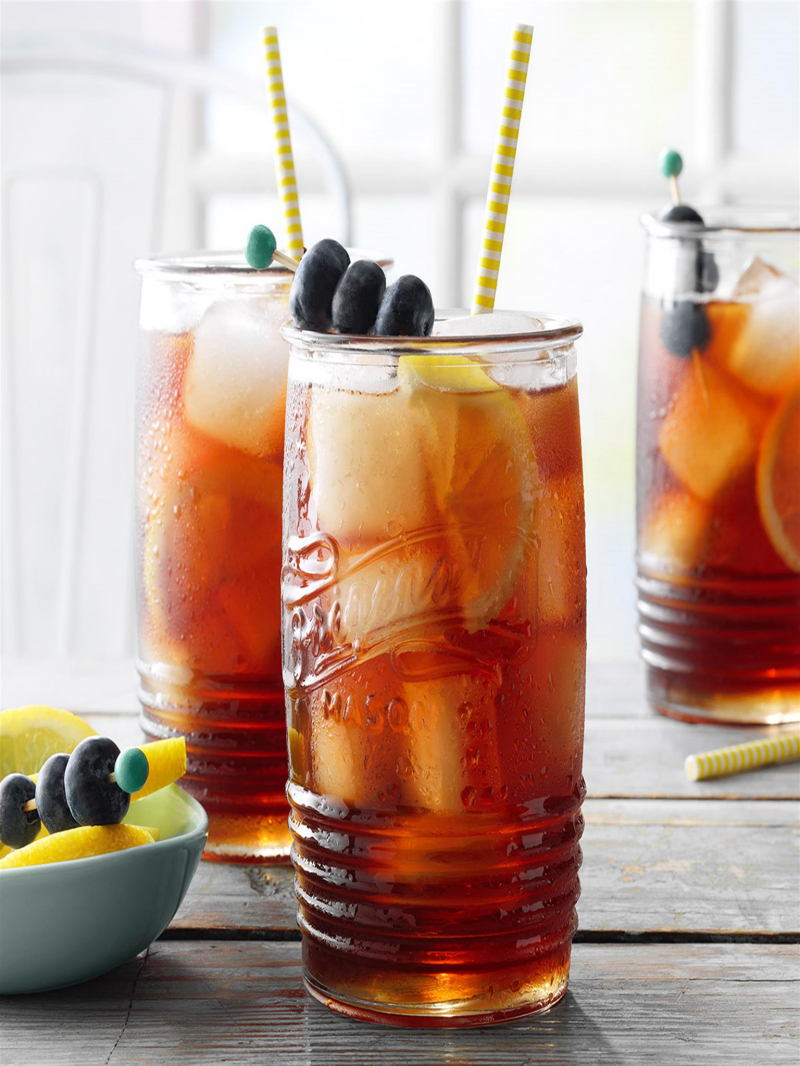
Iced tea 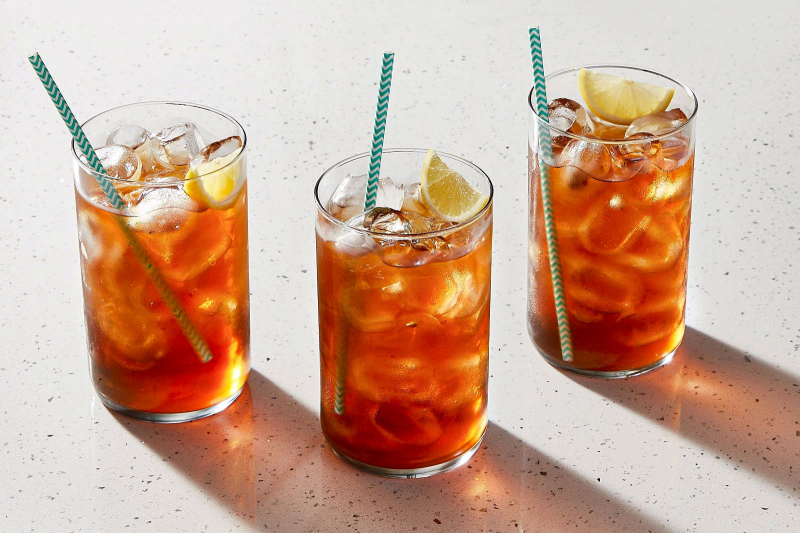
Iced tea -
A common snack is protein bars. Protein-rich foods have been associated with greater feelings of fullness, which can help with weight loss. People now think protein bars are a healthy snack as a result of this.
While there are some protein bars that are more nutritious on the market, many of them have a nutritional value that is comparable to a candy bar because they contain about 20 g of sugar. Many protein bars use unhealthy sweeteners like high fructose corn syrup, which adds excess fructose to your diet and increases your risk of developing fatty liver, obesity, and diabetes when consumed in large quantities. They also often use significant amounts of added sugar. Read the nutrition label before choosing a protein bar, and stay away from those with a lot of sugar. Alternatively, you might have a high-protein snack like yogurt.
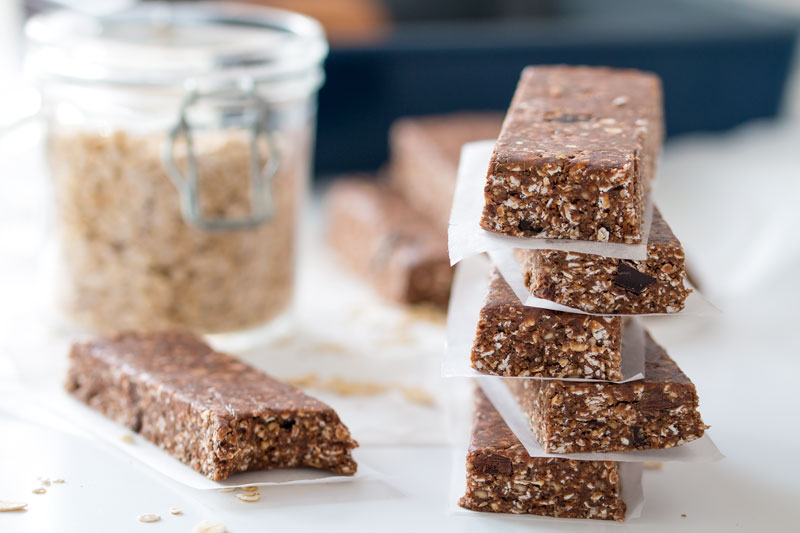
Protein bars 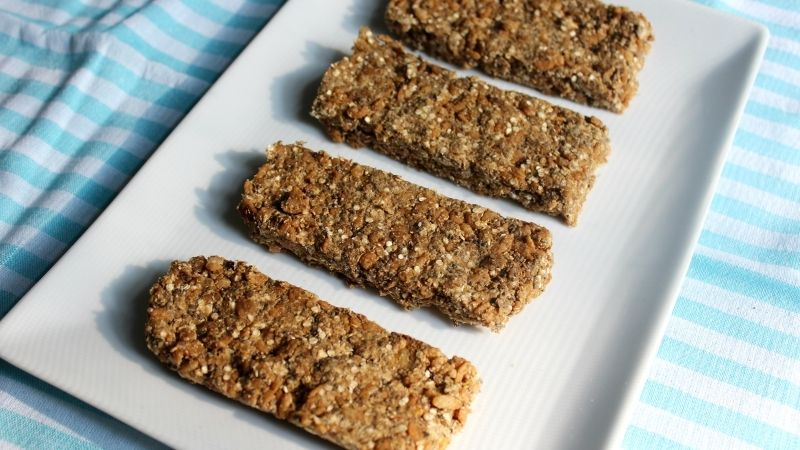
Protein bars -
There's nothing better than a hot bowl of soup during a cold day – or at any time for that matter. It's uncommon to associate sugar with soup. It's a nutritious option and a great way to easily enhance your vegetable intake when made with fresh, whole ingredients.
As long as they are consumed in moderation and are combined with a variety of healthy nutrients, the naturally occurring sugars found in the vegetables used in soups are safe to consume. However, many soups that are made for sale in restaurants sometimes have a lot of extra additives, including sugar. Look for names like sucrose, barley malt, dextrose, maltose high fructose corn syrup (HFCS) and other syrups in the ingredient list of your soup to see if it has added sugars. Keep an eye out for manufacturers who list little amounts of various sugars when buying canned soup, as that may be an indication the product has a high sugar content overall.
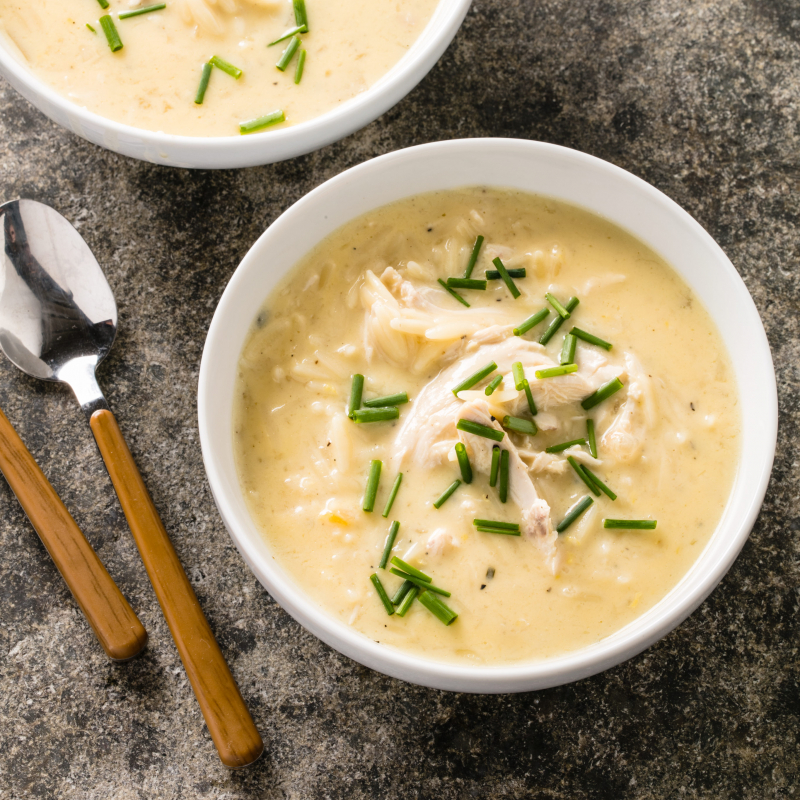
Premade soup 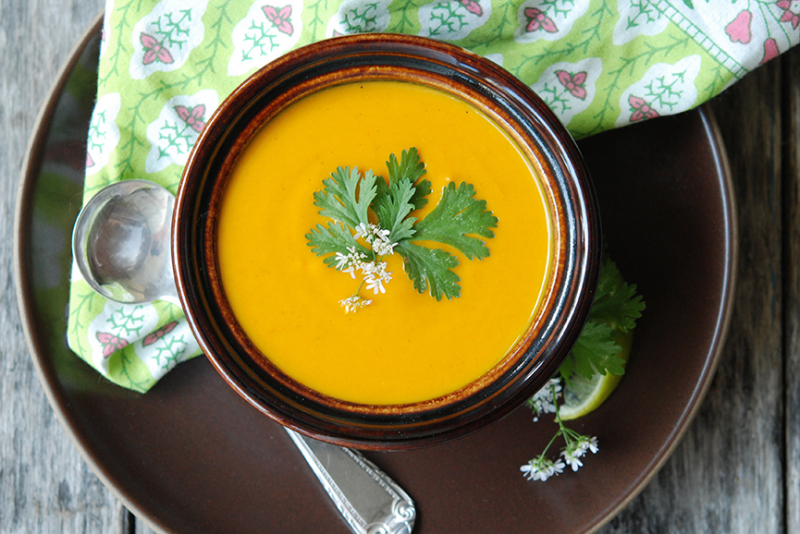
Premade soup -
Popular, quick, and simple breakfast options include cereal. However, if you eat cereal every day, the cereal you pick could have a big impact on how much sugar you consume.
Even breakfast cereals aimed at kids often include a lot of added sugar. Some come in small 34-gram (1.2-ounce) servings and have 12 grams, or 3 teaspoons, of sugar. In 2019, Action on Sugar and Action on Salt conducted a survey for the Food Foundation’s ‘Broken Plate Report’ finding that 49% of breakfast cereals with child-friendly packaging were high in sugar, 86% were high or medium in salt, and 48% were low in fiber. Consider choosing a cereal that is high in fiber and low in added sugar by reading the label. Better still, get up a little earlier and prepare a quick, nutritious breakfast that includes high-protein food, like eggs, as consuming protein for breakfast can help in weight loss.
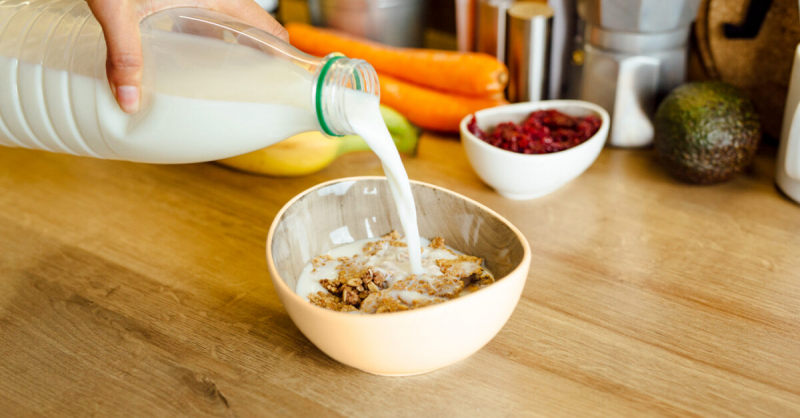
Breakfast cereal 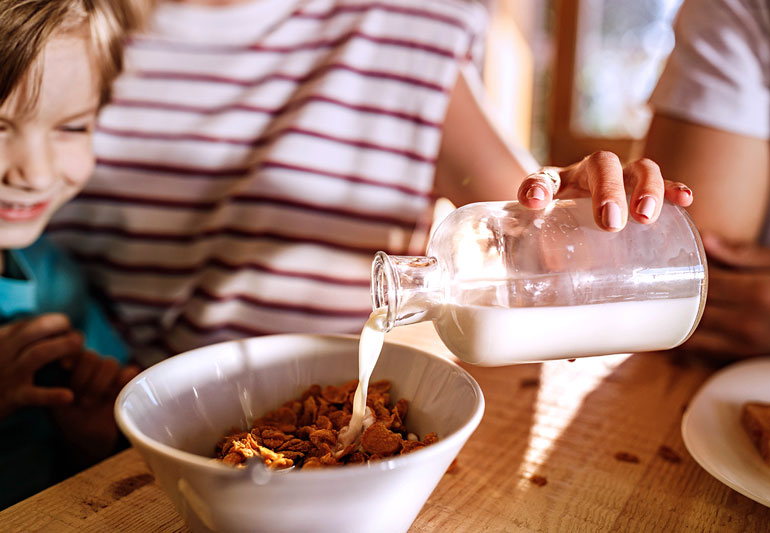
Breakfast cereal -
This is a great example of how extra sugars may unexpectedly sneak into an apparently nutritious diet. To make kombucha beverages more appealing to consumers, many of them are sweetened with fruit juice or cane sugar. While it might improve the flavor of kombucha, doing so increases the amount of sugar in the drink.
Although sugar is necessary for the fermentation of kombucha because the yeast feeds on it and helps produce probiotics that are good for the stomach, many brands add too much. Depending on the brand, just one serving of kombucha can contain as much as 28 grams of sugar, the equivalent of 7 teaspoons. Excessive consumption of added sugars, particularly from beverages with added sugar, can have a variety of detrimental effects on your health. Try to find one with fewer than ten g of sugar per serving.
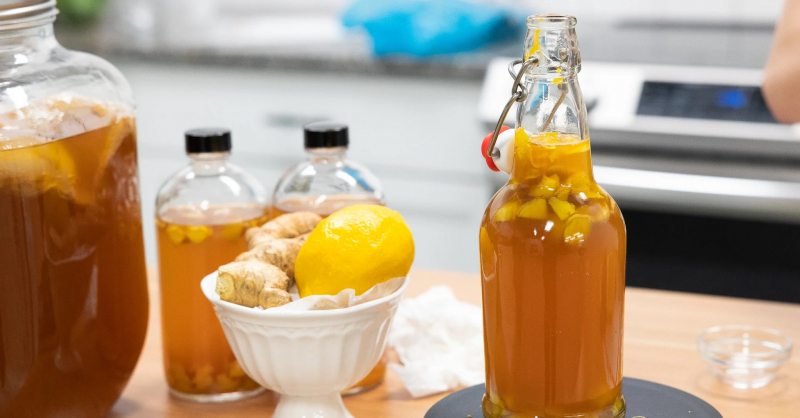
Kombucha 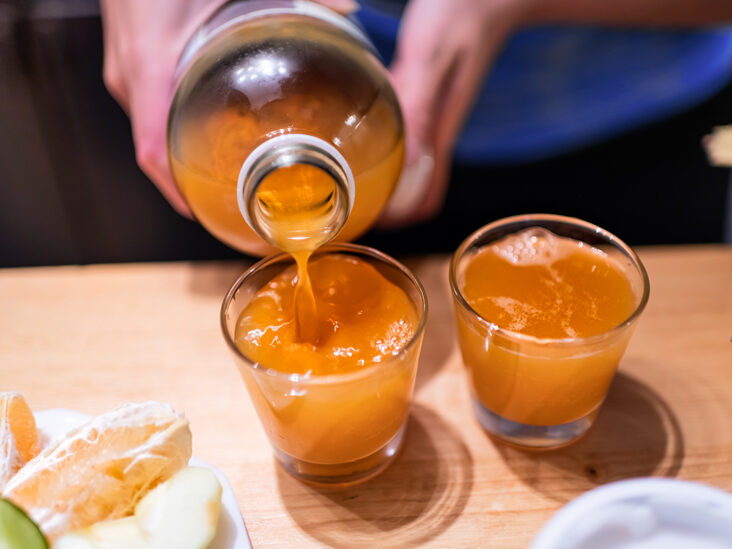
Kombucha -
All fruits have their own natural sugars. Nevertheless, some fruit in cans is peeled and preserved in sweet syrup. This processing depletes the fruit of its fiber and basically turns what should be a nutritious snack into a dessert.
Even fruit sauce, canned peaches, and fruit cocktails may include sugar. For whole, chopped, and diced fruit, it frequently takes the form of a sweet syrup; for fruit that has been pureed, like applesauce, it may take any form of additional sweetness, such as cane sugar or fruit juice concentrate. Although most other nutrients are well preserved, the canning process can potentially damage heat-sensitive vitamin C. Best fruit is fresh, whole fruit. Choose fruit that has been canned in juice rather than syrup if you want to consume canned fruit.
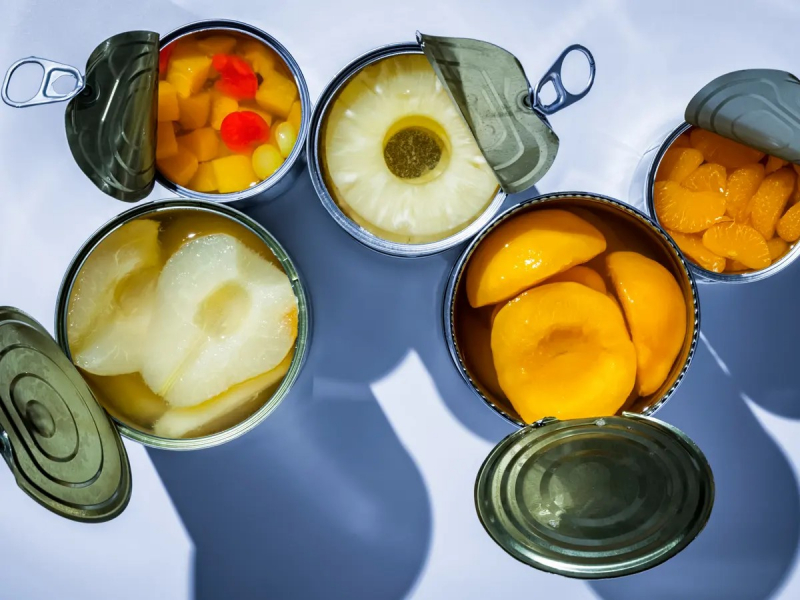
Packaged Fruits 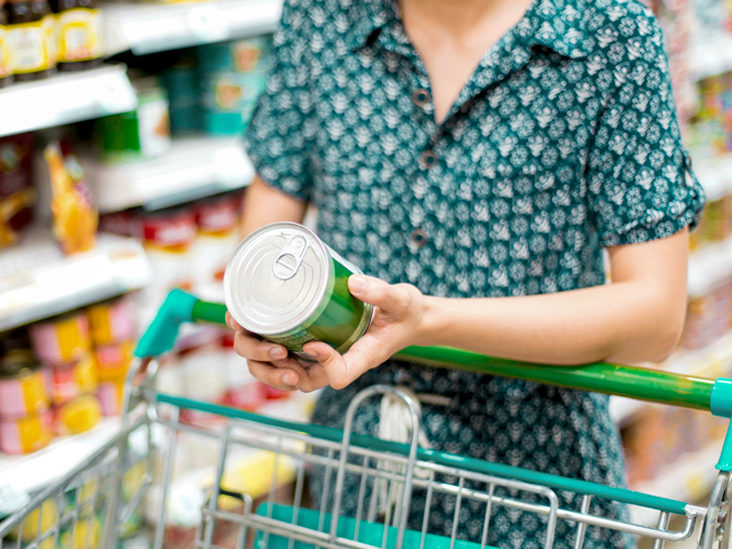
Packaged Fruits

















